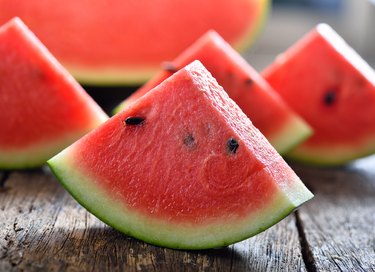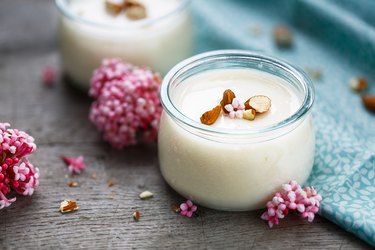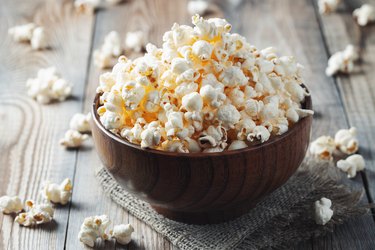
You've been told time and time again what foods you should avoid to lose weight (looking at you, processed foods). But wouldn't it be nice to have a list of weight loss-friendly foods instead? Well, you're in luck.
There are certain foods from all food groups — fruits, vegetables, lean proteins, whole grains, dairy — that have been studied extensively for their role in weight loss. Here are the ones to prioritize when your goal is dropping pounds.
Video of the Day
Video of the Day
1. Water
This first one is a bit of a stretch on being called a "food," but it's your foundation. Water is so important for a few different reasons. By drinking more water, you're likely cutting out other beverages that may have added sugar (read: calories). In addition, dehydration can cause you to confuse feelings of thirst for hunger, which may make you eat more.
Tip
Divide your body weight (in pounds) by two for the number of ounces of water you should drink each day. Try drinking two cups before each meal to tame your appetite.
According to an April 2018 study in the International Journal of Obesity, dieters who substituted water over diet beverages lost more weight, and their body mass index (BMI) decreased more than those who continued to drink diet beverages. So, make water your drink of choice in your weight-loss plan.
2. Greens
Greens — spinach, kale, lettuce, chard, etc. — are a weight-loss friendly food for two reasons: They have a high water content and are low in calories. That means they'll fill you up without (literally) weighing you down.
An April 2017 study in the American Journal of Clinical Nutrition found that just a 12 percent decrease in calories resulted in significant decreases in weight, waist circumference and body fat. So even seemingly small swaps — like a side salad instead of fries — can help you lose weight and keep it off.
Related Reading
3. Olive Oil
You've probably already heard that olive oil is good for your heart, but it may be good for your waistline, too. According to an October 2018 study published in the European Journal of Nutrition, study subjects who were given olive oil over soybean oil lost more weight over nine weeks.
Researchers weren't entirely clear on the reason, especially since there's no calorie difference between the oils, but it may have something to do with the anti-inflammatory properties of olive oil (inflammation and obesity are often present together).
Keep calories in check by substituting olive oil for other oils or butter rather than increasing the overall amount in your diet.
4. Salmon
It may be a "fatty" fish (meaning it's a good source of omega-3 fatty acids), but don't let that fool you — salmon is a boon for weight loss.
A 3-ounce piece of cooked salmon packs nearly 22 grams of protein, per the USDA, which helps you feel full longer without the added saturated fat from proteins like red meat.
Plus, according to an August 2018 review published in The Journal of Nutritional Biochemistry, omega-3s may not help you lose weight, but they can help you maintain the weight you've lost, making them a must-have in any diet.
Related Reading
5. Chickpeas
Chickpeas, or garbanzo beans, are a versatile bean used for hummus and salads and even roasted for snacking. Like other legumes, chickpeas are a weight loss-friendly food because they are full of fiber — a nutrient most of us don't get enough of. In fact, a half cup of chickpeas is going to give you 4 grams of fiber.
Tip
Aim for 25 to 38 grams of fiber a day, according to the 2015-2020 Dietary Guidelines for Americans.
So, how does fiber help with weight loss? It helps fill you up and keep you full. It also isn't digested by the body, so while it fills you up, it also goes right through you — and as a bonus, gets rid of some dietary cholesterol on its way out.
In fact, a study published February 2015 in Annals of Internal Medicine found that simply aiming to eat 30 grams of fiber each day can help you lose weight as effectively as a more complicated diet.
6. Full-Fat Yogurt

This one may seem a little opposite of conventional dietary advice you've been given, but opting for full-fat yogurt over fat-free yogurt may actually help you lose more weight, according to Harvard Health Publishing.
The reason may be that choosing full-fat helps you feel more satisfied, meaning you are likely to stop eating sooner and not eat as much. Adding fresh fruit or nuts to your yogurt ups your fiber intake, which will really keep you full for a while.
7. Oats
Oats have long been regarded as a weight loss-friendly food. Oats contain a special kind of fiber called beta-glucan. Foods high in beta-glucan, like oats, can carry the FDA health claim that they support a heart-healthy diet and lower the risk of heart disease.
How does this help with weight loss? This type of fiber helps control blood sugar by increasing the time it takes for food to move through your body, which helps keep you full. Indeed, according to a March 2013 study published in Plant Foods for Human Nutrition, oats helped reduce body weight in subjects consuming oat cereal for 12 weeks.
8. Watermelon
Watermelon is a perfect summer snack for your weight-loss goals because it's 90 percent water. Two cups of watermelon is less than 100 calories and will help keep you hydrated — and feeling full.
According to a March 2019 study in Nutrients, study subjects were given either watermelon or the same number of calories in low-fat cookies. The watermelon group lost more weight and had a greater fullness response than the cookie group, proving that quality is just as important as quantity when it comes to calories.
9. Farro
If you're trying to lose weight, you're probably cutting out some foods that have a tendency to make you overeat, like bread and pasta. You never want to cut out complete food groups, though, because grains are a source of B vitamins and fiber. This is where other whole grains come in, like farro and quinoa.
One serving of farro is one-quarter cup of dry farro and it gives you 7 grams each of fiber and protein — not too shabby. That fiber and protein are going to keep you full long after you eat. Pair this with roasted vegetables and grilled chicken breast and you have a hearty and complete meal.
Related Reading
10. Blackberries
Blackberries have a whopping 8 grams of fiber per cup, which is pretty significant. Blackberries are high in phytochemicals, too, which are being studied for their effects on weight loss, according to October 2016 research published in Nutrients.
Fruits are often snubbed in the weight-loss world because of their simple sugars (read: carbs), but researchers — including those in the Nutrients study above — have found that fruit intake is actually inversely proportional to weight. This means that eating more fruit does not make you gain weight, but can actually help you lose weight.
11. Almonds
Nuts in general are high in fat and that means they are high in calories, so how can it be that nuts are a weight loss-friendly food?
Well, nuts like almonds also have protein, fiber and antioxidants, so having a handful of them in place of an unhealthy snack (think: chips) is a good choice for weight loss. According to a July 2014 review published in the American Journal of Clinical Nutrition, when nuts were included in a diet, there was lower risk of weight gain. Keep your servings to a handful, though.
12. Popcorn

Snacking when you're losing weight is a good way to quash hunger between meals, but you'll want to choose the right one. When you air-pop your own popcorn, you control how many calories you get. If you're craving a crunch, three cups of air-popped popcorn is less than 100 calories and serves up almost 4 grams of fiber.
All of this fiber means you might feel more full after eating popcorn. According to a September 2012 study published in the Nutrition Journal, popcorn was found to be more satisfying than potato chips and study participants ate less at their next meal.
Related Reading
13. Sauerkraut
Fermented foods are a hot topic and popular items in grocery stores. They offer a probiotic benefit because of the bacteria they produce. Introducing more bacteria into the gut is a way to keep your body healthy. A decrease in gut diversity is often found in people with obesity, according to February 2019 research published in Nutrients.
There isn't conclusive evidence to support the use of probiotic foods for weight loss specifically, but restoring gut diversity with foods like sauerkraut, kombucha and kimchi can't hurt.
14. Eggs
While eggs are typically considered a breakfast food, they have a place at all hours of the day when it comes to weight loss because they're high in protein and relatively low in calories. If you'd like to stick with breakfast, though, research has your back.
According to June 2013 research published in the European Journal of Nutrition, when three different breakfast choices were provided (eggs on toast, cornflakes with milk and toast, or a croissant with orange juice), the individuals who ate the eggs had greater feelings of satiety and ate fewer calories at lunch and dinner. That's big if you're trying to reduce calories to lose weight.
Related Reading
15. Cauliflower
The low-carb darling of the dieting world isn't just the king of keto, but might also help you keep your calories low by losing weight with a healthy diet that includes all foods. One cup of cauliflower has only 27 calories and 2 grams of fiber.
What's even more impressive is that, according to a September 2015 analysis in PLOS Medicine, an increase in cruciferous vegetables — including cauliflower, broccoli and cabbage — was associated with a decrease in weight. Researchers attribute the reduction in weight to these vegetables being low on the glycemic index scale (a measure of how fast a food raises your blood sugar) and high in fiber.
Ready to Lose Weight?
Set yourself up for success with LIVESTRONG.com's 30-Day Weight-Loss Kickstart.
What Should I Eat in a Day to Lose Weight?
You obviously can't eat all of these foods every day. But fitting in some of these weight loss-friendly foods is a great place to start. For example, your day might look like this:
- Breakfast: Savory Oatmeal Topped With a Fried Egg and 1 cup blackberries
- Snack 1: Handful of almonds
- Lunch: Pistachio and Chickpea Crunch Salad
- Snack 2: Air-popped popcorn with olive oil and herbs
- Dinner: Farro With Charred Vegetables topped with grilled salmon
If you're not sure where to start or worried about a medical condition that might impact your ability to lose weight, have a conversation with your primary health care provider and get a referral to a registered dietitian who can help evaluate your current diet and set you up for success.
- International Journal of Obesity: "Effects of Replacing Diet Beverages With Water on Weight Loss and Weight Maintenance: 18-month Follow-Up, Randomized Clinical Trial"
- American Journal of Clinical Nutrition: "Body-composition Changes in the Comprehensive Assessment of Long-term Effects of Reducing Intake of Energy (CALERIE)-2 Study: A 2-y Randomized Controlled Trial of Calorie Restriction in Nonobese Humans"
- European Journal of Nutrition: "Consumption of Extra Virgin Olive Oil Improves Body Composition and Blood Pressure in Women With Excess Body Fat: A Randomized, Double-Blinded, Placebo-Controlled Clinical Trial"
- The Journal of Nutritional Biochemistry: "Omega-3 Fatty Acids in Obesity and Metabolic Syndrome: A Mechanistic Update"
- Journal of Nutrition: "Fiber Intake Predicts Weight Loss and Dietary Adherence in Adults Consuming Calorie-Restricted Diets: The POUNDS Lost (Preventing Overweight Using Novel Dietary Strategies) Study"
- Harvard Medical School: "Is it Time to Stop Skimming Over Full-Fat Dairy?"
- Plant Foods for Human Nutrition: "Oat Prevents Obesity and Abdominal Fat Distribution, and Improves Liver Function in Humans"
- Nutrients: "Effects of Fresh Watermelon Consumption on the Acute Satiety Response and Cardiometabolic Risk Factors in Overweight and Obese Adults"
- Nutrients: "Paradoxical Effects of Fruit on Obesity"
- American Journal of Clinical Nutrition: "Long Term Associations with Nut Consumption with Body Weight and Obesity"
- Nutrition Journal: "Popcorn is More Satiating Than Potato Chips in Normal Weight Adults"
- Nutrients: "Probiotics: How Effective Are They in the Fight against Obesity?"
- European Journal of Nutrition: "Variation in the Effects of Three Different Breakfast Meals on Subjective Satiety and Subsequent Intake of Energy at Lunch and Evening Meal"
- PLOS Medicine: "Changes in Intake of Fruits and Vegetables and Weight Change in United States Men and Women Followed for Up to 24 Years: Analysis from Three Prospective Cohort Studies"
- USDA FoodData Central: "Fish, salmon, chinook, cooked, dry heat"
- U.S. Department of Health and Human Services: "2015-2020 Dietary Guidelines for Americans"
- Annals of Internal Medicine: "Single-Component Versus Multicomponent Dietary Goals for the Metabolic Syndrome"
- USDA FoodData Central: "Cauliflower, raw"